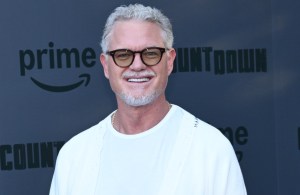Country music scion Whey Jennings has opened up about his harrowing 27-year battle with drug addiction and the road to sobriety. The grandson of legendary artists Waylon Jennings and Jessi Colter, Whey has transformed his life and is now using his music to help others struggling with similar demons.
In a candid interview with Fox News Digital, the 43-year-old Nashville recording artist revealed the depths of his addiction and the turning point that led him to seek help. “My moral structure was horrible for many years,” Jennings confessed. “I even got into the music business for the wrong reasons. I just wanted the cliché sex, drugs and rock ‘n’ roll. It was just a horrible decision after a horrible decision.”
Videos by PopCulture.com
Jennings’ wake-up call came when he nearly lost the woman who would eventually become his wife. “Getting her back is what really sent me over the edge,” he admitted. “Once I thought she was gone, I nose-dived into my addiction… I was just floating right on top of rock bottom… I needed to go get help.”
With the support of his manager and a “glimmer of hope” that he could reconcile with his love, Jennings finally entered rehab. The decision marked the beginning of a remarkable transformation. Now four years sober, Jennings proudly shared, “I’ve gotten all my kids back. I’ve gotten married… my wife had a baby. All my kids remember me on drugs except my 3-year-old daughter. She’s never known me to be intoxicated in any way.”
Jennings’ commitment to sobriety extends beyond just abstaining from drugs. “I don’t drink, I don’t smoke weed, I don’t smoke cigarettes, I don’t vape. I don’t do none of that,” he emphasized. This complete lifestyle change has allowed him to be fully present in his family life and pursue his passion for meaningful music.
The singer’s journey from addiction to recovery is reflected in his music. His new single, “Sleeves,” is an emotional ballad that focuses on the dark cycle of addiction. Jennings has also released his first full-length album, Jekyll & Hyde, which explores the various facets of his life experiences.
Despite his famous lineage, Jennings didn’t always envision a career in music. As the son of Terry Jennings, Waylon’s oldest son, Whey grew up loving his grandfather’s music but only pursued his own musical path about a decade ago. “Everybody in our family has fought tooth and nail to be themselves,” Jennings explained.
His commitment to helping others extends beyond his music. He has partnered with Mobilize Recovery, an organization that provides direct outreach to communities to assist those struggling with addiction. As part of this collaboration, Jennings is performing and sharing his story at events in Las Vegas and Richmond, Virginia.
The country artist is passionate about dispelling misconceptions about addiction. “You go out to have a good time and to quit thinking about all the problems in your life,” he explained. “You start chasing a buzz. And then you get so deep into chasing that buzz that you wake up one day 27 years later, and you’ve [given] your life to a drug addiction, and you can’t get it back.”
Jennings stressed that recovery is not an instant process but a journey that requires dedication and patience. “That’s the one thing we want as addicts – we want instant gratification,” he noted. “We want to solve the problem and get instant results. That’s just not going to happen… You’ve got to prove yourself to people, especially after you’ve already proven that you haven’t been trustworthy for a long time.”
Today, Jennings is committed to using his platform to make a difference. “I’m not chasing fame,” he shared. “I’m not chasing the Top 40 charts… I do this to support my family mostly, and to follow the path I believe is going to make the biggest difference in the world.”
His approach to performing goes beyond just singing. At concerts, Jennings often engages with fans, sharing his experiences and offering encouragement to those who may be struggling. “I don’t only sing my songs from the stage,” he explained. “I tell stories about who I am, where I come from, why I have a strong belief in God, why I have a strong belief that anybody can get sober.”
As he continues his musical journey, Jennings remains dedicated to his sobriety and his mission to help others. His story serves as a powerful testament to the possibility of change and the transformative power of music. “If you do all the necessary footwork that it takes to not only become sober, but trustworthy again, then your life will get a lot better,” he affirmed. “I promise you – I’m living proof of it.”
Reflecting on his journey, Jennings added, “Music is a strong tool and can be used in so many ways. You can talk to somebody about their problems and they don’t ‘hear’ you. But you can write a song about the same thing and sing it to them, and there will be tears in their eyes when it’s over. Tell me there ain’t no power in music.”
Most Viewed
-

WINDSOR, UNITED KINGDOM – APRIL 20: (EMBARGOED FOR PUBLICATION IN UK NEWSPAPERS UNTIL 24 HOURS AFTER CREATE DATE AND TIME) Prince Andrew, Duke of York attends the traditional Easter Sunday Mattins Service at St George's Chapel, Windsor Castle on April 20, 2025 in Windsor, England. (Photo by Max Mumby/Indigo/Getty Images)







